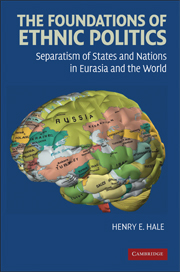Book contents
- Frontmatter
- Contents
- Acknowledgments
- Note on Transliteration
- 1 INTRODUCTION
- Part I Theory with Worldwide Examples
- Part II Case Comparisons: Separatism in Eurasia
- 5 ETHNICITY: IDENTITY AND SEPARATISM IN THE USSR 1917–1991
- 6 CENTRAL STATE POLICIES AND SEPARATISM
- 7 FRAMING: MANIPULATING MASS OPINION IN UKRAINE AND UZBEKISTAN
- 8 INSTITUTIONALLY MEDIATED INTERESTS: THE POLITICAL ECONOMY OF SECESSIONISM
- 9 ETHNICITY AND INTERNATIONAL INTEGRATION: THE CIS 1991–2007
- 10 QUANTITATIVE EVIDENCE: MICRO-, MACRO-, AND MULTILEVEL
- Part III Conclusion
- Index
- Other Books in the Series
- References
7 - FRAMING: MANIPULATING MASS OPINION IN UKRAINE AND UZBEKISTAN
Published online by Cambridge University Press: 05 September 2012
- Frontmatter
- Contents
- Acknowledgments
- Note on Transliteration
- 1 INTRODUCTION
- Part I Theory with Worldwide Examples
- Part II Case Comparisons: Separatism in Eurasia
- 5 ETHNICITY: IDENTITY AND SEPARATISM IN THE USSR 1917–1991
- 6 CENTRAL STATE POLICIES AND SEPARATISM
- 7 FRAMING: MANIPULATING MASS OPINION IN UKRAINE AND UZBEKISTAN
- 8 INSTITUTIONALLY MEDIATED INTERESTS: THE POLITICAL ECONOMY OF SECESSIONISM
- 9 ETHNICITY AND INTERNATIONAL INTEGRATION: THE CIS 1991–2007
- 10 QUANTITATIVE EVIDENCE: MICRO-, MACRO-, AND MULTILEVEL
- Part III Conclusion
- Index
- Other Books in the Series
- References
Summary
Why was Ukraine's leadership consistently more inclined to reject central union-saving initiatives than was Uzbekistan's throughout the final years of the Soviet Union? The relational theory posits that the driving force behind secessionism is an ethnically charged collective action problem, in which case variation in separatism is likely to come from factors influencing how this problem is perceived and evaluated. The previous chapter demonstrated that, in fact, both the Ukrainian and Uzbek governments regularly shifted their attitudes toward a union in response to what Soviet central authorities were proposing and how they were proposing it. Yet the actual proposals of the union center are not the only factors capable of influencing perceptions of the root collective action problem. As Chapter 4 argued, ethnofederal regional leaders are likely to have considerable power to frame center-periphery relations for their constituents, meaning that they can potentially alter mass understandings of the core collective action problem by promoting different frames. Thus, when institutions force leaders to be at least somewhat responsive to masses' perceptions of their own interests, framing strategies can enable leaders to pursue policies closer to their own personal preferences than might be otherwise possible. The relational theory, then, fits easily with the notion that leadership framing can explain why some ethnic regions display more separatism than others.
- Type
- Chapter
- Information
- The Foundations of Ethnic PoliticsSeparatism of States and Nations in Eurasia and the World, pp. 140 - 160Publisher: Cambridge University PressPrint publication year: 2008



